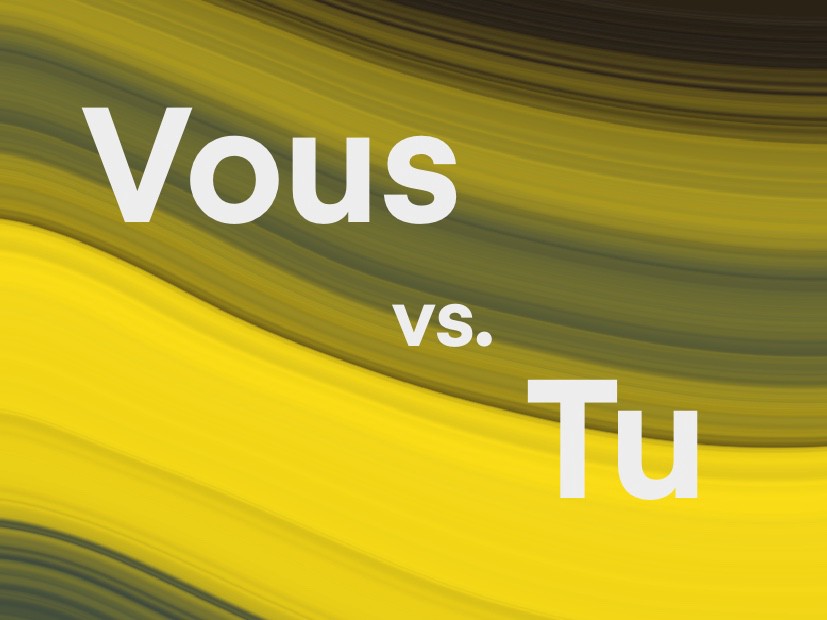In the past, we used to have two different ways to say, ?you? in English. We?ve always had ?you?, but we also used to have ?thou?. In French, there still exist two different ways to say you.
In old English, we used to have the word ?thou?, which was used when talking informally, that is to say when speaking to people we knew well. The word ?you? was reserved for more formal occasions; it was used when speaking to people we didn?t know or those who were older than us. In French, even today, there are two ways to say you: ?tu? and ?vous?.
MORE BLOG POSTS | HOME | LANGUAGE COURSES

TU
The word ?tu? is equivalent to the word ?thou?. It is classed as an ?informal singular? word. What this means is that you only ever use it when you?re speaking to just one person whom you know well. This could be a friend or family member. You can also use ?tu? in French when you?re speaking to somebody who is younger than you.
VOUS
The word ?vous?, on the other hand, is used in all other situations. It actually has two uses. Firstly, it?s classed as a ?formal singular? word, which means that you can use it when speaking to one person whom you?re not overly familiar with. This is usually considered the more polite way of saying ?you?, and if you?re being spoken to by somebody working in a shop or a restaurant or a bank, for example, they will usually address you as ?vous?. Additionally, you would tend to use ?vous? when you?re speaking to somebody who is older than you.
Secondly, ?vous? is also classed as the ?plural? way of saying ?you?. That means if you?re speaking to more than one person, be it two people or a group of a million people, you must always address them as ?vous?. It doesn?t matter if you know them or not, and it doesn?t matter how formal you?re trying to be; if you?re speaking to more than one person in French, you will always call them ?vous?.
Using ?tu? and ?vous? with verbs
Now, obviously, you would never (or very rarely) use ?tu? or ?vous? just by themselves, just like you wouldn?t really ever just say the word ?you? by itself. Usually, you would use these two words with a verb.
In French, the ending of the verb changes depending on whether you?re using ?tu? or ?vous?. I?ll try not to turn this post into a huge, long-winded verb conjugation lesson, but generally, you?ll notice that verbs that are used with ?vous? end in the letters ?ez?, whereas verbs that are used with ?tu? end in the letter ?s?. Here are a few examples of this in use:
What would you like to eat?Que voudrais-tu manger?Que voudriez-vous manger?
You speak French very wellTu parles trs bien le franaisVous parlez trs bien le franais
Where do you live?O habites-tu?O habitez-vous?
If this doesn?t make sense to you at all, I?ve written a course that explains how to use verbs in French, and it?s called ?Quick Guide: French Verbs 1?. It shows you, in an easy method, how to conjugate French verbs into the present, past and future tenses. It also assumes you know no French at all before you start, meaning it is useful for any level. You can get it for 9.99 on Udemy by clicking here, or you can get two months? free access on SkillShare by clicking here.
Anyway, so you use ?tu? with one person you know, and you can use ?vous? for anybody else (one person you don?t know very well, or more than one person whom you may or may not know). I would say if you?re travelling in France, just stick to using ?vous? and you won?t inadvertently offend anybody. People will also tell you if they want you to use ?tu? with them.
The many faces of ?tu?
The good thing about ?vous? is that it comes in one form and one form only, and that form is ?vous?. Whether you?re using ?vous? as a subject pronoun, an object pronoun or after a preposition, it is always just ?vous?.
Subject pronounVous mangez assez rapidement ? You eat quite quicklyParlez-vous franais? ? Do you speak French?Vous devez attendre ici ? You have to wait here
Object pronounJe vais vous montrer tout demain ? I?m going to show you tomorrowPierre ne vous comprend pas ? Pierre doesn?t understand youJe pense que Marie vous a vu hier ? I think Marie saw you yesterday
With a preposition*a c?est pour vous ? That is for youJe vais aller sans vous ? I?m going to go without youHugo s?entend-il bien avec vous? ? Does Hugo get on well with you?*just in case you were wondering, prepositions are words like to, at, from, of, with, without, for
Here are a few in French: ? to/atde ? of/fromavec ? withsans ? withoutpour ? for
With ?tu? however, it changes depending on what it is used as. The word ?tu? is a subject pronoun, but if you want to use it as an object pronoun, you have to change it to ?te?. If you want to use it with a preposition, you have to use ?toi? instead. Here are some examples of what I mean using the same sentences I used with ?vous?:
Subject pronounTu manges assez rapidement ? You eat quite quicklyParles-tu franais? ? Do you speak French?Tu dois attendre ici ? You have to wait here
Object pronounJe vais te montrer demain ? I?m going to show you tomorrowPierre ne te comprend pas ? Pierre doesn?t understand youJe pense que Marie t?a vu hier ? I think Marie saw you yesterday*
In the last sentence, you can see that te becomes t? in front of a word that starts with a vowel or the letter h.
With a prepositiona c?est pour toi ? That is for youJe vais aller sans toi ? I?m going to go without youHugo s?entend-il bien avec toi? ? Does Hugo get on well with you?
You might have seen the word ?te? in the phrase, ?s?il te plat?. You?ve more than likely seen ?s?il vous plat?, which means ?please?, however, only if you?re speaking formally or to more than one person. If you?re speaking to one person informally, you use ?s?il te plat? instead.
So, you use ?tu? as a subject pronoun, ?te? as an object pronoun and ?toi? after a preposition. And we also learnt that the object pronoun te shortens to t? when it?s placed in front of a word that starts with a vowel or the letter h. This might seem strange because we just use ?you? for everything in English, however, if you look back to the old usage of ?thou?, you?ll see that ?thou? was a subject pronoun, but it changed to ?thee? when it was used as an object pronoun or with a preposition:
Subject pronounThou speakest very quicklyVous parlez trs rapidementTu parles trs rapidement
Object pronounI can see theeJe peux vous voirJe peux te voir
With a prepositionI?m going without theeJe vais sans vousJe vais sans toi

Possessives
As well as the word ?you?, we also have the words ?your? and ?yours? in English. Well, these also exist in French. In olden English, the ?thou? equivalent of ?your? was ?thy? and ?yours? was ?thine?.
In French, the words for ?your? and ?yours? (or ?thy? and ?thine?) depend on whether the word that follows is masculine or feminine, and singular or plural.
For example, the word ?car? is feminine in French (voiture), whilst ?dog? is masculine (chien).
So let?s look how to say ?your? when you?re using ?tu?:
your dog ? ton chienyour dogs ? tes chiensyour car ? ta voitureyour cars ? tes voitures
So, you can see we have ?ton?, ?ta? and ?tes?. ?Ton? is used with masculine singular nouns, ?ta? is used with feminine singular nouns, and ?tes? is used with all plural nouns.
Now, let?s look at the ?vous? versions of this:
your dog ? votre chienyour dogs ? vos chiensyour car ? votre voitureyour cars ? vos voitures
So, you see that there are only two forms of ?your? when you?re using ?vous?. There?s the singular ?votre? and the plural ?vos?.
Now let?s look at ?yours?. Just like before, when you?re using ?tu?, there is a masculine singular form and a feminine singular form, but there is also a masculine plural form and a feminine plural form (instead of just one plural form):
It?s yoursC?est le tien (masculine singular)C?est la tienne (feminine singular)
These are yoursCes sont les tiens (masculine plural)Ces sont les tiennes (feminine plural)
We have le tien, la tienne, les tiens and les tiennes, which all mean ?yours? in the masculine singular, feminine singular, masculine plural and the feminine plural forms.
Now, let?s have a gander at the ?vous? equivalents to this:
It?s yoursC?est le vtre (masculine singular)C?est la vtre (feminine singular)
These are yoursCes sont les vtres (plural)
There are only three forms with ?vous?; there?s le vtre, la vtre and les vtres, which are the masculine singular, the feminine singular and the plural versions of the word ?yours?.
Phew, that section might have seemed a little tough and complex, but don?t worry if some of it didn?t quite make sense yet. Sometimes, when you learn something new, the first time you read about it, it?s basically putting the knowledge in your mind and making you aware of its existence. That doesn?t necessarily mean that you?re going to understand it straight away, though. Now that you?ve been given the information, your brain will start to process it, and then, gradually, it will make more and more sense as you see more everyday examples of it in use. Eventually, you?ll get to the point where you are confident enough with this new information that you?ll be able to use it yourself in everyday conversations.
Just on a side note, that reminds me of another word that has ?tu? and ?vous? alternatives: yourself. In fact, ?yourself? and ?yourselves? depending on whether you?re speaking to one person or more than one person.
YourselfToi-mmeVous-mme
YourselvesVous-mmes
Finally, there is just one very short section I?m going to add:
YOU?RE
Since there are two words for ?you? in French, it goes without saying that there must also be two ways to say ?you?re?
you?retu esvous tes
They both literally mean ?you are?, and neither of them contract in French like it does in English.
Let?s end this article with a few examples of the different words for you, your, yours and yourself in French.
Are you going to keep your money for yourself?Vas-tu garder ton argent pour toi-mme?Allez-vous garder votre argent pour votre-mme
I?ve finished your homework for youJ?ai fini tes devoirs pour toiJ?ai fini vos devoirs pour vous
Can you bring your car with you?Peux-tu apporter ta voiture avec toi?Pouvez-vous apporter votre voiture avec vous?
Have you forgotten your things?As-tu oubli tes choses?Avez-vous oubli vos choses?
What did you do with your hair?Qu?as-tu fait avec tes cheveux?Qu?avez-vous fait avec vos cheveux?
____________________________________________
MORE BLOG POSTS | HOME | LANGUAGE COURSES


